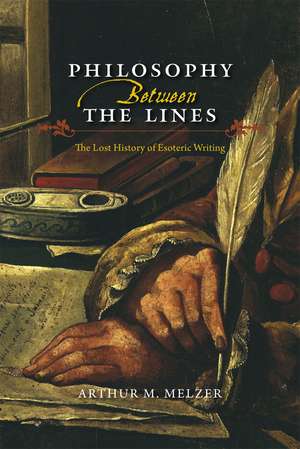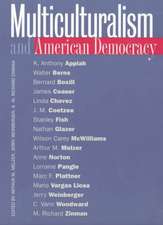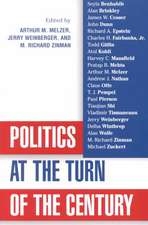Philosophy Between the Lines: The Lost History of Esoteric Writing
Autor Arthur M. Melzeren Limba Engleză Paperback – 17 feb 2017
Philosophical esotericism—the practice of communicating one’s unorthodox thoughts “between the lines”—was a common practice until the end of the eighteenth century. The famous Encyclopédie of Diderot, for instance, not only discusses this practice in over twenty different articles, but admits to employing it itself. The history of Western thought contains hundreds of such statements by major philosophers testifying to the use of esoteric writing in their own work or others’. Despite this long and well-documented history, however, esotericism is often dismissed today as a rare occurrence. But by ignoring esotericism, we risk cutting ourselves off from a full understanding of Western philosophical thought.
Arthur M. Melzer serves as our deeply knowledgeable guide in this capacious and engaging history of philosophical esotericism. Walking readers through both an ancient (Plato) and a modern (Machiavelli) esoteric work, he explains what esotericism is—and is not. It relies not on secret codes, but simply on a more intensive use of familiar rhetorical techniques like metaphor, irony, and insinuation. Melzer explores the various motives that led thinkers in different times and places to engage in this strange practice, while also exploring the motives that lead more recent thinkers not only to dislike and avoid this practice but to deny its very existence. In the book’s final section, “A Beginner’s Guide to Esoteric Reading,” Melzer turns to how we might once again cultivate the long-forgotten art of reading esoteric works.
Philosophy Between the Lines is the first comprehensive, book-length study of the history and theoretical basis of philosophical esotericism, and it provides a crucial guide to how many major writings—philosophical, but also theological, political, and literary—were composed prior to the nineteenth century.
Arthur M. Melzer serves as our deeply knowledgeable guide in this capacious and engaging history of philosophical esotericism. Walking readers through both an ancient (Plato) and a modern (Machiavelli) esoteric work, he explains what esotericism is—and is not. It relies not on secret codes, but simply on a more intensive use of familiar rhetorical techniques like metaphor, irony, and insinuation. Melzer explores the various motives that led thinkers in different times and places to engage in this strange practice, while also exploring the motives that lead more recent thinkers not only to dislike and avoid this practice but to deny its very existence. In the book’s final section, “A Beginner’s Guide to Esoteric Reading,” Melzer turns to how we might once again cultivate the long-forgotten art of reading esoteric works.
Philosophy Between the Lines is the first comprehensive, book-length study of the history and theoretical basis of philosophical esotericism, and it provides a crucial guide to how many major writings—philosophical, but also theological, political, and literary—were composed prior to the nineteenth century.
Preț: 240.52 lei
Nou
Puncte Express: 361
Preț estimativ în valută:
46.04€ • 50.02$ • 38.70£
46.04€ • 50.02$ • 38.70£
Carte disponibilă
Livrare economică 31 martie-14 aprilie
Livrare express 15-21 martie pentru 35.08 lei
Preluare comenzi: 021 569.72.76
Specificații
ISBN-13: 9780226479170
ISBN-10: 022647917X
Pagini: 471
Dimensiuni: 152 x 229 x 33 mm
Greutate: 0.65 kg
Editura: University of Chicago Press
Colecția University of Chicago Press
ISBN-10: 022647917X
Pagini: 471
Dimensiuni: 152 x 229 x 33 mm
Greutate: 0.65 kg
Editura: University of Chicago Press
Colecția University of Chicago Press
Notă biografică
Arthur M. Melzer is professor of political science at Michigan State University, where he is also cofounder and codirector of the Symposium on Science, Reason, and Modern Democracy. He is the author of The Natural Goodness of Man.
Cuprins
Preface
Acknowledgments
Introduction: What Is Philosophical Esotericism?
Part One
The General Evidence and Argument for the Reality of Philosophical Esotericism
1. The Testimonial Evidence for Esotericism
2. Interlude: Two Brief Examples
3. The Theoretical Basis of Philosophical Esotericism: The “Problem of Theory and Praxis”
4. Objections, Resistance, and Blindness to Esotericism
Part Two
The Four Forms of Philosophical Esotericism
5. Fear of Persecution: Defensive Esotericism
6. Dangerous Truths: Protective Esotericism
7. The Educational Benefits of Obscurity: Pedagogical Esotericism
8. Rationalizing the World: Political Esotericism
Part Three
The Consequences of the Recovery of Esotericism
9. A Beginner’s Guide to Esoteric Reading
10. Defending Reason: Esotericism and the Critique of Historicism
Notes
Bibliography
Index
Acknowledgments
Introduction: What Is Philosophical Esotericism?
Part One
The General Evidence and Argument for the Reality of Philosophical Esotericism
1. The Testimonial Evidence for Esotericism
2. Interlude: Two Brief Examples
3. The Theoretical Basis of Philosophical Esotericism: The “Problem of Theory and Praxis”
4. Objections, Resistance, and Blindness to Esotericism
Part Two
The Four Forms of Philosophical Esotericism
5. Fear of Persecution: Defensive Esotericism
6. Dangerous Truths: Protective Esotericism
7. The Educational Benefits of Obscurity: Pedagogical Esotericism
8. Rationalizing the World: Political Esotericism
Part Three
The Consequences of the Recovery of Esotericism
9. A Beginner’s Guide to Esoteric Reading
10. Defending Reason: Esotericism and the Critique of Historicism
Notes
Bibliography
Index
Recenzii
“Philosophy Between the Lines offers the best statement on this topic that there is. Melzer makes clear that the topic is important and his book is so well-written, cogently argued, and thoroughly researched that it will be of great interest to readers in intellectual history, history of philosophy, and all related disciplines."
“Modern scholarship has been afflicted by an astonishing amnesia about esoteric writing. The manner in which Melzer undertakes to overcome that amnesia reminds me over and over again of the way Holmes tries to demystify his own modus operandi to the befuddled Watson: ‘You see, but you do not observe.’ This is a work of exceptional clarity about a phenomenon that is commonly held to be impenetrable or unintelligible or nonexistent.”
"This is a book scholars have needed for a long time. There has been so much more heat than light in the contentious debates about esoteric writing since Leo Strauss tried to reanimate attention to the phenomenon in the 1930s that it is surprising that no one has tried to set out carefully the various aspects of the rhetorical practice and to compile the evidence that it not only existed but was a prominent feature of philosophical writing until the nineteenth century. Melzer has finally done this; lucidly, patiently, and in a graceful conversational style. But he goes much farther. His book is philosophical as well as scholarly. It goes to the issue of late modern self-understanding itself, what we care about and what one might call our collective psychological relationship to the issue. No one even remotely interested in the topic of philosophical writing can afford to ignore this book. It is a major achievement and the sort of book that anyone can both strongly disagree with and at the same time be very grateful for."
"Philosophy Between the Lines is a treasure-house of insight and learning. It is that rare thing: an eye-opening book. It is candid about secrets, and there is no book like it. Melzer succeeds in his aim of showing that until the Enlightenment, almost all philosophers wanted to be understood by only a few and were worried that if they spoke all the truth they knew they would suffer persecution or contribute to the demoralization of society. Without an awareness of the esoteric strategy, we would not know how to understand the course of speculation from Plato onward. Melzer lights up every issue he examines. By making the world before Enlightenment appear as strange as it truly was, he makes our world stranger than we think it is."
"Starting from the seminal work of Leo Strauss, Melzer has given us, in lucid prose, the most comprehensive explanation and defense of the practice of esoteric writing we have. For Melzer, the overall function of esotericism is to make it possible for the reader to release him or herself from unconsciously accepted self-delusions: it is the basis of the 'realm of freedom.' Melzer distinguishes several forms of esotericism—defensive (evading censorship or persecution), protective (of 'dangerous truths'), pedagogical (the need to pass through obscurity in order to see clearly), and political (the production of a harmony of theory and praxis). It is necessarily left to the reader of this excellent work to decide if Melzer has written an exoteric or esoteric book. After all, after the condemnation of his Emile, Rousseau (about whom Melzer has written a fine volume) once wrote in a draft of a letter to the Archbishop Beaumont: 'In truth, there are no more secrets to keep, nor truths to silence.' A book that will call one out."
"The best book I know on esoteric writing and its history."
“Good prose strives to be clear and direct. Or so we all think now. Melzer’s remarkable book shines a floodlight on a topic that has been cloaked in obscurity: esoteric writing. . . . Philosophy Between the Lines is a double achievement, a landmark work in both intellectual history and political theory. For the reader who is in the habit of underlining, be prepared to have a second pen on hand as your ink will run dry by mid-volume."
“Those of us introduced to the history of moral and political philosophy by students of Leo Strauss would sometimes ask for evidence backing their claim that the great writers of the past practiced a lost art of esoteric writing. . . . Here Meltzer finally delivers the kind of work we asked for back then. . . . The book does an excellent job collecting the evidence for the existence of philosophic esotericism, . . . amass[ing] an enormous amount of testimony from major figures in every age from Classical Antiquity through the Renaissance and Enlightenment.”
“In the years since a million ill-informed, fantastical hit pieces on Strauss for his insidious influence on the administration of George W. Bush, a series of Strauss’ students and admirers have stepped forward to defend his work. . . . But for my money, the best by far is Melzer’s Philosophy Between the Lines. . . . It deserves a wide and appreciative audience. And if it gets one, the consequences could be enormous.”
"The most important book published in political philosophy in years is Melzer’s Philosophy Between the Lines."
“Melzer has performed a heroic service, finally making it possible for general readers to understand esoteric writing and why it has become such a controversial issue. . . . Even people who think that they are already experts on secret writing will benefit from reading this book, and not just because of its wealth of historical detail. Melzer has formulated the central issues at stake with unparalleled clarity, and he probes the subject with genuine philosophical depth. . . . [Philosophy Between the Lines] is one of the most important books I’ve read in years.”
“Much can be learned from Melzer. . . . The book calls into question basic assumptions about how we read. Drawing from an expansive canon, it sketches a profound view of the relation between rhetoric and philosophy. Perhaps most importantly, Melzer offers a bracingly clear, sharply argued prolegomenon to Strauss’s painstaking and miraculous readings of individual texts—a fitting anteroom for a bewildering and exhilarating intellectual funhouse.”
“Do philosophers lie? Do those for whom the investigation of truth is the highest calling ever engage, not just on occasion but as a matter of course, in systematic strategies of concealment and deception? Do philosophers write esoterically? On the evidence provided by Melzer’s Philosophy Between the Lines, the resounding answer to all the above is 'yes.' Melzer’s book is the best study we have—or are likely to have—on the theme of esoteric writing. . . . The book provides absolutely compelling evidence for the ongoing practice of esoteric writing in the philosophical tradition.”
“Melzer provides an extensive examination of the phenomenon of esoteric writing as it has been practiced through the centuries in the West. . . . This is a landmark scholarly work in the study of the history of political thought. . . . Melzer’s book will leave only the most willful in the dark. . . . An outstanding book.”
“Brilliant, pellucid, and meticulously researched. . . . To prove the fact of esoteric writing, Melzer compiles a virtual Mount Everest of explicit statements by thinkers about themselves or others that they wrote esoterically. . . . Melzer tells this story with finesse and attention to detail; anticipation of objections and polite but careful responsiveness to them; and powerful examples of esoteric writing techniques. Moreover, he shows in precise detail how contemporary resistance to esotericism is rooted in our contingent historical circumstances. . . . Philosophy Between the Lines is one of the best books I’ve read in a long time.”
“Melzer’s analysis of esotericism is a great advance on Strauss’s analysis: this book is a major contribution.”
"Significantly advances our understanding of the theory and practice of esoteric philosophical and political writing."
"Significantly advances our understanding of the theory and practice of esoteric philosophical and political writing."
"Melzer has shown it irrefutably: Philosophers from ancient times to our own have not always said exactly what they meant, and they have not always meant exactly what they said. . . . [An] exceedingly careful and graceful writer, . . . [Melzer has] produced a truly accessible book about esotericism.”
“An intensely researched study. . . . Melzer’s work enables us, as though for the first time, to assess the historical reality and philosophical significance of esotericism.”
“Melzer has provided iron-clad textual evidence for the existence of literally millennia’s worth of examples of (his understanding of what counts as) esoteric writing. [He] also encourages the reader to reconsider her hermeneutic framework(s) and makes long, painstaking work paramount. . . . Melzer’s book encourages one to read a great deal, and to read and reread slowly and carefully, to pause, to work backwards and forwards in the text in front of us, and ultimately to entertain thoughts that, in the context of our reigning interpretative methods, are usually treated as pariahs.”
“Melzer’s book is a masterful treatment of the ‘lost’ history of esoteric writing from Socrates to the present day. Before reading Philosophy Between the Lines, I myself was not well-disposed toward the practice of esoteric reading. However, this book has convinced me that any attempt to read the history of philosophy without being willing to pry into the author’s ‘secret intentions’ would be a naive and ill-conceived enterprise. . . . [This is] an impressive work of scholarship, and it deserves to be pondered by anyone with a serious interest in philosophical texts.”






